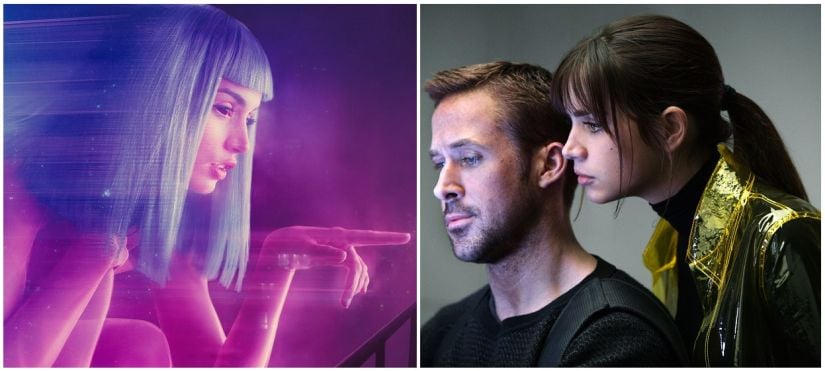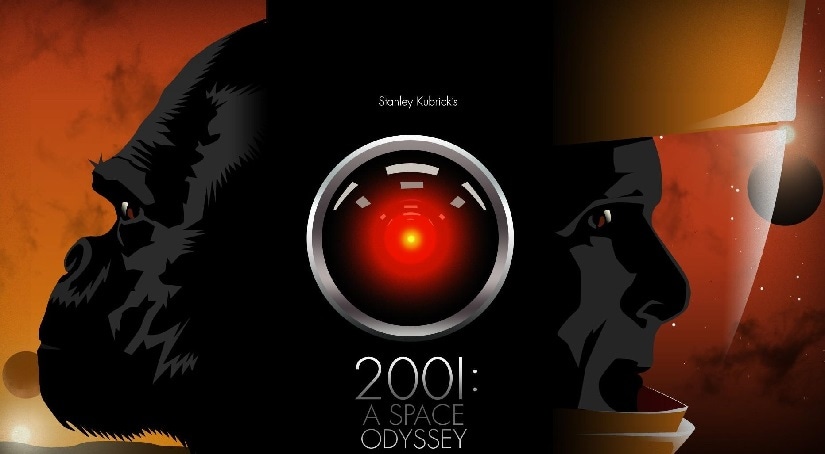In a Hollywood oversaturated with reboots, remakes and revivals, it is exceedingly rare to find a worthy second act that is every bit as remarkable as the original. Case in point: Blade Runner 2049 [caption id=“attachment_4373345” align=“alignnone” width=“825”] A promo poster for Blade Runner 2049[/caption] When the sci-fi spectacle released last October, it was refreshing to see that Denis Villeneuve had not only captured the tone and themes of its 1982 predecessor Blade Runner but had enriched and expanded its universe. As artificial intelligence becomes increasingly prevalent in our society with major technological advancements in robotics and genetics, the film asked plenty of troubling but extremely relevant questions about its various ethical quandaries. And it also happened to be 2017’s most luscious audio-visual buffet. Yet, much like Ridley Scott’s original film, Stanley Kubrick’s 2001: A Space Odyssey, Steven Spielberg’s Close Encounters of the Third Kind and numerous other visionary sci-fi masterpieces, Blade Runner 2049 too was snubbed by the snobbish Academy for the industry’s top prize. The ‘why’ boils down to primarily that — Grade A genre snobbery. While science fiction films dominate the technical award categories almost every year, they are rarely considered for Best Picture at the Oscars. Even when they are, the odds of their victory are embarrassingly low. From a thoughtful alien invasion drama like Arrival to one baked in gritty realism like District 9; from an offbeat love story like Her to a mainstream-friendly space opera like Star Wars; from the dystopian nightmare of A Clockwork Orange to the nitro-fueled post-apocalypse of Mad Max: Fury Road; not a single one of them went on to win the the Oscars’ most prestigious honour. [caption id=“attachment_4373351” align=“alignnone” width=“825”]
 Blade Runner 2049 takes a look at the relationship between a bioengineered android (Ryan Gosling) and his holographic AI companion (Ana de Armas).[/caption] The Academy, instead, prefers epic costume dramas soaked in schmaltz, social consciousness and (faux) sophistication. They dismiss sci-fi,
horror and other genres that are wholly of the imagination as “mere” escapism. The rich, white men — who make up the majority of the Academy’s voting members — seemingly prefer ideas grounded in social realism. But sci-fi borrows most of its ideas from observations of our own reality and examines them through a fantastical lens. By creating a futuristic world based on our own, it usually modifies one significant variable of our world and teases the consequences of that change. When you think about it, each sci-fi film is a truly remarkable social experiment that helped reveal some deeper truth about ourselves. In Blade Runner 2049, Villeneuve uses Ridley Scott’s neo-noir cult classic as a springboard to explore new ideas. He imagines a dystopian society where the line between humans and artificial intelligence have ultimately become blurred. Like its source material — Philip K Dick’s Do Androids Dream of Electric Sheep? — the film challenges mankind’s scientific hubris in creating a new race of beings only to enslave them, without ever considering the moral implications of their daring venture. Like the best of sci-fi films, it poses plenty of other interesting questions: What if artificial intelligence demand the right to self-determination? What if their gradual evolution gives them the ability to reproduce? Will it cement their status as humanity’s equals? But do they truly know and understand what it means to be human and loved? Do we? Or is it just our memories that define us and establish our humanity? [caption id=“attachment_4373339” align=“alignnone” width=“825”]
Blade Runner 2049 takes a look at the relationship between a bioengineered android (Ryan Gosling) and his holographic AI companion (Ana de Armas).[/caption] The Academy, instead, prefers epic costume dramas soaked in schmaltz, social consciousness and (faux) sophistication. They dismiss sci-fi,
horror and other genres that are wholly of the imagination as “mere” escapism. The rich, white men — who make up the majority of the Academy’s voting members — seemingly prefer ideas grounded in social realism. But sci-fi borrows most of its ideas from observations of our own reality and examines them through a fantastical lens. By creating a futuristic world based on our own, it usually modifies one significant variable of our world and teases the consequences of that change. When you think about it, each sci-fi film is a truly remarkable social experiment that helped reveal some deeper truth about ourselves. In Blade Runner 2049, Villeneuve uses Ridley Scott’s neo-noir cult classic as a springboard to explore new ideas. He imagines a dystopian society where the line between humans and artificial intelligence have ultimately become blurred. Like its source material — Philip K Dick’s Do Androids Dream of Electric Sheep? — the film challenges mankind’s scientific hubris in creating a new race of beings only to enslave them, without ever considering the moral implications of their daring venture. Like the best of sci-fi films, it poses plenty of other interesting questions: What if artificial intelligence demand the right to self-determination? What if their gradual evolution gives them the ability to reproduce? Will it cement their status as humanity’s equals? But do they truly know and understand what it means to be human and loved? Do we? Or is it just our memories that define us and establish our humanity? [caption id=“attachment_4373339” align=“alignnone” width=“825”] In Arrival, a linguist (Amy Adams) attempts to communicate with aliens who have mysteriously arrived on Earth.[/caption] Look underneath the sprawling vistas, the hazy colour-saturated landscapes and the naked hologram models of its neon-lit metropolis, Villeneuve’s unsettling vision of the future seems prescient in an age where climate change scepticism, environmental deterioration and artificial intelligence loom as humanity’s biggest existential threats. Of course, this is not the first time Villeneuve has asked such deeper, grander “What if?” questions with incredible emotional intelligence. In Arrival, he took on heady themes like the nature of language and the free will vs fate dichotomy in an alien invasion drama where finding the key to communication becomes a race against time. Using a deceptive linear narrative, he crafted not only one of the most daring and meditative sci-fi films, but also a deeply moving one. Perhaps no science fiction film was as ground-breaking, influential and prophetic as Kubrick’s 2001: A Space Odyssey (which incidentally turns 50 this year). The film’s painstakingly realistic portrayal of space travel and exploration still holds up today as a benchmark for sci-fi fare. Its evolutionary and philosophical inquiries ushered in the renaissance of the cerebral sci-fi genre. It accurately predicted advanced technologies like teleconferencing (Skype), tablet computers, computer gaming (chess), computer guidance systems, zero gravity toilets and a sentient (sinister) artificial intelligence. Kubrick developed a new visual language for sci-fi films that would later be built on by Steven Spielberg, George Lucas, Ridley Scott, Christopher Nolan and many more. [caption id=“attachment_4373337” align=“alignnone” width=“825”]
 Stanley Kubrick’s visionary masterpiece, 2001: A Space Odyssey, remains the most influential sci-fi film in history.[/caption] Yet, at the end of the day, both 2001: A Space Odyssey and Arrival won nothing more than a consolation award in the technical categories. For another reason as to why, let’s go back to the earliest surviving work of literary criticism that perhaps laid the foundation to the theory of genres. In Poetics, Aristotle listed out what he thought were the essential ingredients of good story telling, ranking them in descending order of importance: (1) mythos (plot), (2) character, (3) thought (idea), (4) diction (dialogue), (5) melody (music), and (6) spectacle (special effects and other technical aspects). All your typical Oscar-bait dramas follow this age-old arrangement almost religiously. But when you think about science fiction, it perhaps lays more emphasis on the “idea.” Even the “spectacle” and “music” are equally important — if not more so — as “plot” and “character.” One of the Academy’s largest and most powerful voting bloc is the actors and it is discernible why they’d think “character” is more important than “idea” — why they’d prefer more performance-based and character-driven narratives in dramas over stories based on abstract ideas. Plenty of excellent high-concept dramas have used elements of sci-fi to explore familiar themes, such as the vicissitudes of love and modern dating (Her, Eternal Sunshine of the Spotless Mind, Upstream Colour and The Lobster) or mankind’s potentially disastrous trajectory (A Clockwork Orange, Children of Men, Gattaca, Mad Max: Fury Road, Snowpiercer and other dystopian films). These were films that gave equal priority to “plot,” “character” and “idea.” Each one of them has stretched the known boundaries of the cinematic medium and the limits of our imagination in their own unique way. But the Academy didn’t think they deserved an Oscar for Best Picture either. [caption id=“attachment_4373347” align=“alignnone” width=“825”]
Stanley Kubrick’s visionary masterpiece, 2001: A Space Odyssey, remains the most influential sci-fi film in history.[/caption] Yet, at the end of the day, both 2001: A Space Odyssey and Arrival won nothing more than a consolation award in the technical categories. For another reason as to why, let’s go back to the earliest surviving work of literary criticism that perhaps laid the foundation to the theory of genres. In Poetics, Aristotle listed out what he thought were the essential ingredients of good story telling, ranking them in descending order of importance: (1) mythos (plot), (2) character, (3) thought (idea), (4) diction (dialogue), (5) melody (music), and (6) spectacle (special effects and other technical aspects). All your typical Oscar-bait dramas follow this age-old arrangement almost religiously. But when you think about science fiction, it perhaps lays more emphasis on the “idea.” Even the “spectacle” and “music” are equally important — if not more so — as “plot” and “character.” One of the Academy’s largest and most powerful voting bloc is the actors and it is discernible why they’d think “character” is more important than “idea” — why they’d prefer more performance-based and character-driven narratives in dramas over stories based on abstract ideas. Plenty of excellent high-concept dramas have used elements of sci-fi to explore familiar themes, such as the vicissitudes of love and modern dating (Her, Eternal Sunshine of the Spotless Mind, Upstream Colour and The Lobster) or mankind’s potentially disastrous trajectory (A Clockwork Orange, Children of Men, Gattaca, Mad Max: Fury Road, Snowpiercer and other dystopian films). These were films that gave equal priority to “plot,” “character” and “idea.” Each one of them has stretched the known boundaries of the cinematic medium and the limits of our imagination in their own unique way. But the Academy didn’t think they deserved an Oscar for Best Picture either. [caption id=“attachment_4373347” align=“alignnone” width=“825”] Films like Her, Eternal Sunshine of the Spotless Mind, Children of Men and A Clockwork Orange are dramas that use sci-fi elements to explore more traditional themes.[/caption] There’s also a paradoxical perception that the more intelligent sci-fi films (and books) are somehow too complex for simple-minded mainstream audiences yet, at the same time, they are trivialised by some critics and ‘academia’ for their apparent lack of sophistication. Many perceive sci-fi’s fantastical tropes to be distractions. The use of special effects to depict these intriguing ideas doesn’t hold well with its octogenarian snobs, who merely see it as a demonstration of technical expertise. Thus, sci-fi films tend to clean up mostly in consolatory categories like Production Design, Sound Editing, Sound Mixing and Visual Effects with the odd screenplay and cinematography honours. This combination of ill-founded bias and general naivety — that science fiction has no relevance to our real life — has lead to decades of discrimination against some of the most talented filmmakers. Oscar nominations have long sparked outrage for their lack of diversity. The Academy are sure shifting in the right direction when it comes to gender parity and racial diversity. But the lack of genre diversity in the major categories still leaves much to be desired. The Academy’s set-in-stone parameters about what makes for Best Picture-worthy films don’t just do disservice to certain genres but also to the filmmakers and their audiences. They are basically saying, “Hey, it was an enchanting, gorgeously shot, highly imaginative audio-visual spectacle but if you want to be taken seriously, do away with everything that makes it unique.” Throughout its 90-year history, not a single science fiction film has won Best Picture at the Oscars. Meanwhile, the only thing sci-fi filmakers can continue to do — which they are of course exceptionally skilled at — is dare to dream.
Films like Her, Eternal Sunshine of the Spotless Mind, Children of Men and A Clockwork Orange are dramas that use sci-fi elements to explore more traditional themes.[/caption] There’s also a paradoxical perception that the more intelligent sci-fi films (and books) are somehow too complex for simple-minded mainstream audiences yet, at the same time, they are trivialised by some critics and ‘academia’ for their apparent lack of sophistication. Many perceive sci-fi’s fantastical tropes to be distractions. The use of special effects to depict these intriguing ideas doesn’t hold well with its octogenarian snobs, who merely see it as a demonstration of technical expertise. Thus, sci-fi films tend to clean up mostly in consolatory categories like Production Design, Sound Editing, Sound Mixing and Visual Effects with the odd screenplay and cinematography honours. This combination of ill-founded bias and general naivety — that science fiction has no relevance to our real life — has lead to decades of discrimination against some of the most talented filmmakers. Oscar nominations have long sparked outrage for their lack of diversity. The Academy are sure shifting in the right direction when it comes to gender parity and racial diversity. But the lack of genre diversity in the major categories still leaves much to be desired. The Academy’s set-in-stone parameters about what makes for Best Picture-worthy films don’t just do disservice to certain genres but also to the filmmakers and their audiences. They are basically saying, “Hey, it was an enchanting, gorgeously shot, highly imaginative audio-visual spectacle but if you want to be taken seriously, do away with everything that makes it unique.” Throughout its 90-year history, not a single science fiction film has won Best Picture at the Oscars. Meanwhile, the only thing sci-fi filmakers can continue to do — which they are of course exceptionally skilled at — is dare to dream.
While science fiction films dominate the technical award categories almost every year, they are rarely considered for Best Picture at the Oscars. Here’s why.
Advertisement
End of Article


)
)
)
)
)
)
)
)
)



